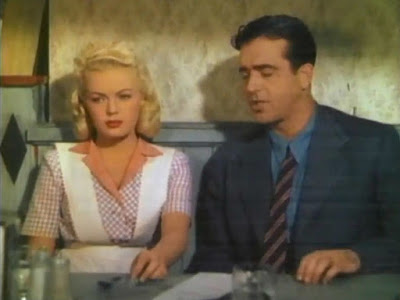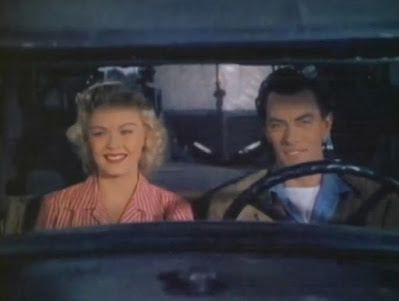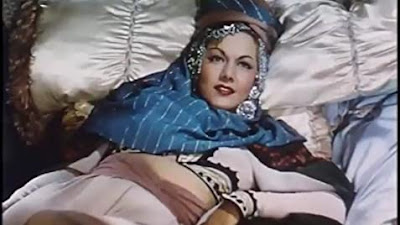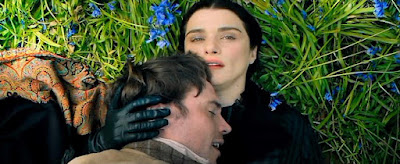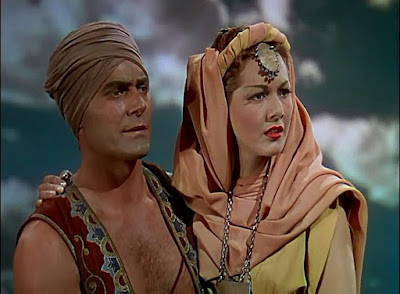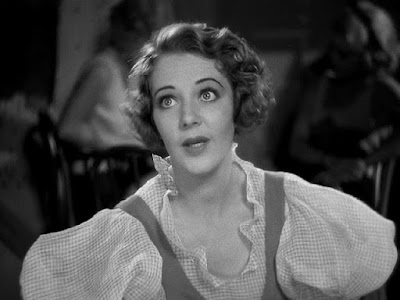FILMS I JUST COULDN'T FINISH ROUND SIX.
As noted previously, these are not reviews, per se, but notes on films that I watched or suffered through until I just gave up on them for one reason or another. Sometimes I skipped to different sections just to get a sense of what was going on or to see if the film became more entertaining. Not all of these pictures are necessarily bad, they just didn't hold my attention. If you see one on the list that you think deserves another look, let me know.
We're Rich Again (1934) deals with a once-wealthy family who are nearly bankrupt because of an upcoming wedding, with a process server camping outside the front door. I had high hopes for this allegedly screwball comedy but even the presence of Edna May Oliver and Billie Burke couldn't wring out any real laughs from this. Buster Crabbe spends most of his time in the swimming pool
The Hardy Boys in the Mystery of Ghost Farm (1957) was actually a serial that appeared on The Mickey Mouse Club. When I saw this on youtube I thought it was a real find, but I wasn't into it very long when I realized that this had little to do with the books I had loved, that the Hardy Boys (Tim Considine and Tommy Kirk) in the serial were borderline obnoxious, and the story was pretty silly and tedious. Although Frank and Joe Hardy already had girlfriends in the classic books, in this Frank has just discovered girls to Joe's dismay -- he just wants to solve mysteries. If only!
Edge of Fury (1958) concerns a psychopathic young man who gets involved in the lives of a woman and her two daughters at their beach domicile. This movie had its points of interests but it's one of those low-budget independent pictures that either grabs you or just turns out to be a waste of time. I gave it about forty minutes and gave up.
Fire Monsters Against the Son of Hercules (1962) was actually an Italian peplum flick originally titled Maciste sontrol i mostri. Several of these dubbed flicks were turned into "Son of Hercules" features with a terrible pop tune playing over the credits. Our hero battles a silly-looking sea monster that has rolling eyes. Even I couldn't stand that much of this!
The Caretaker (1963), also known as
The Guest, is adapted from Harold Pinter's play by Pinter himself. I was impressed by the fine acting of Donald Pleasance and Robert Shaw during the first half hour, but then Alan Bates walked in and started stinking everything up with his obnoxious performance of an odious character (as he did in
Butley). Pinter and Bates? I could abide no more!
Five Golden Dragons (1967), produced by Harry Alan Towers, concerns an American (Bob Cummings) in Hong Kong who gets involved with the titular criminal cult. In his last film, Cummings -- still playing the aging epicene bumbling playboy like he did in Love That Bob! -- is completely out of place in a kind of dull euro-thriller that fails to hold the attention. The "dragons" are played by Chris Lee, George Raft, Dan Duryea, and Brian Dunlevy in unnecessary cameos that at least netted them a trip to Hong Kong. Terrible!
Leaving Las Vegas (1995). I had wanted to see this for years, but after about half an hour I was already bored with the lives of these pathetic losers. I don't like spending time with people like this in real life, so why should I spend over two hours with them in a movie? Yes, I know the film is acclaimed and Nicolas Cage won an Oscar, and I'm certainly not saying that it's bad, but with so many other choices to watch this just didn't grip my attention.
Perry Mason: The Case of the Jealous Jokester (1995 telefilm). After Raymond Burr's death, the producers of the TV movies decided to continue the franchise with Hal Holbrook playing not Perry Mason, but a lawyer known as Wild Bill McKenzie who was a friend of Mason's. This is the second and last of two films featuring Holbrook. Burr's absence makes the entire enterprise seem pointless but while I did try to get into this, I found it tedious.
Antlers (2021) starts out promisingly and has a classy look, but this story of odd doings in a mine and a strange creature that haunts a young boy is so slow-paced and has such little energy that after awhile I skipped to the finale and found it to be just more of the same in monster flick terms. Very disappointing, although there is some decent acting and slick cinematography.
Death on the Nile (2022). Although I enjoyed Kenneth Branagh's remake of Murder on the Orient Express, I was less impressed with this rather plodding remake of Death on the Nile. Part of the problem, for me at least, is my familiarity with the storyline and the various twists created by Agatha Christie. But while the cinematography is first-rate I found this production to be somewhat listless. Once the main murder occurred, I knew what was coming and I wasn't sufficiently energized to see how Branagh would handle the very same events. Maybe there were differences in this version, I don't know and I just didn't care. For some reason the whole thing reminded me of a 1930's musical. The prologue relating how and why Poirot grew his famous mustache is unnecessary, to say the least.
